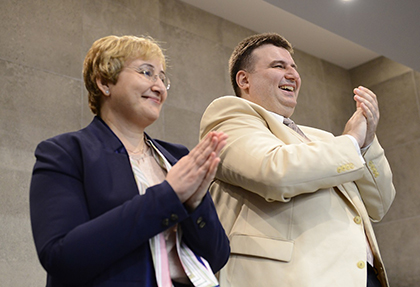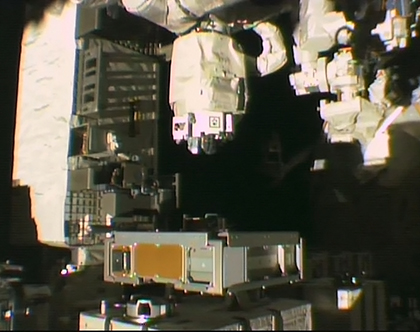This is an archive of information released in the past.
Disclaimer: It may contain broken links or outdated information. Some parts may not function in current web browsers.
*Visit https://humans-in-space.jaxa.jp/en/ for the latest information.

Experiment
- News
- Kibo Utilization Strategy
- Kibo Utilization Plan
- List of JAXA's Utilization Themes
- Experiment Facilities
- Space Environment Utilization
- Archive
Initiating the second joint exposed experiment on board "Kibo" with the Republic of Turkey
In the evening of May 23, 2018, the second experiment of the collaboration mission between Japan and Turkey (*1) has been initiated using the Experiment Handrail Attachment Mechanism (ExHAM) of the Exposed Facility, an external platform outside the Japanese Experiment Module (JEM) "Kibo" of the International Space Station (ISS).
In this experiment, potential satellite-oriented polymer materials with radiation resistant properties will be exposed to space environment for about a year and have performance evaluation after returned to Earth.
At the start of the experiment, researchers from Istanbul Technical University visited Japan and witnessed the moment with JAXA officials in the Kibo Mission Control Room at JAXA Tsukuba Space Center (TKSC).
Comment by Professor Nilgun Baydogan of Istanbul Technical University witnessing the moment the experiment being initiated
We are honored to have this precious opportunity for experiments using the actual space environment. We expect that the results obtained from this experiment will contribute to the development of communication satellite technology.
Researchers of Istanbul Technical University observing the experiment in the Kibo Mission Control Room (Credit: JAXA)
ExHAM where the experiment samples from Turkey were installed and their exposure experiment was being initiated (Credit: JAXA/NASA)
Along with the Japan-Turkey collaboration experiment, a Japanese experiment has also been underway for "Assessment of degradation of polymer fiber material device exposed to cosmic rays" proposed by Kyoto Institute of Technology, selected as the first utilization theme for the ExHAM onerous utilization program that started in JFY 2017.
The theme whose experiment was initiated so shortly, only five months after the conclusion of the contract, demonstrates that space experiments have become more accessible.
*1:Cooperation mission between Japan and the Republic of Turkey
The "cooperation on Kibo utilization" is a Japan-Turkey national cooperation. In December 2010, "the cooperation agreement relating a space and aeronautical field" was signed by Minister of Education, Culture, Sports, Science and Technology (MEXT) of Japan, and Minister of State for Space Policy, and Ministry of Transport, Maritime Affairs and Communications (MTMAC) of the Republic of Turkey.
Eventually, Japanese Prime Minister Abe and Turkish President Erdogan promised to deepen the "strategic partnership" between the two countries at the Japan-Turkey Summit Meeting held in October 2015.
Upon the bilateral agreement, on September 8, 2016, JAXA and the Republic of Turkey's MTMAC signed a cooperation agreement related to "Kibo" utilization.
The cooperation agreement stipulates that JAXA will offer Turkey opportunities to deploy a 3U CubeSat and conduct long-term exposure experiments of materials and other subjects (twice).
- JAXA and the Ministry of Transport, Maritime Affairs and Communications, Republic of Turkey sign a Cooperation Agreement (Sep. 9, 2016)
The first long-term material exposure experiment was initiated in April, 2017 and the second experiment was initiated after samples of the first experiment were replaced with the next. The first experiment samples will be returned to the Earth by the Dragon spacecraft (SpX-15).
TOPICS
- Turkey hands over samples to Japan for a space materials exposure experiment - Experiment to begin next spring on the exposed facility of "Kibo"! (January 11, 2018)
- Initiating the joint exposed experiment with the Republic of Turkey utilizing the Exposed Experiment Handrail Attachment Mechanism(ExHAM) (April 18, 2017)
*All times are Japan Standard Time (JST)
| Copyright 2007 Japan Aerospace Exploration Agency | Site Policy |

